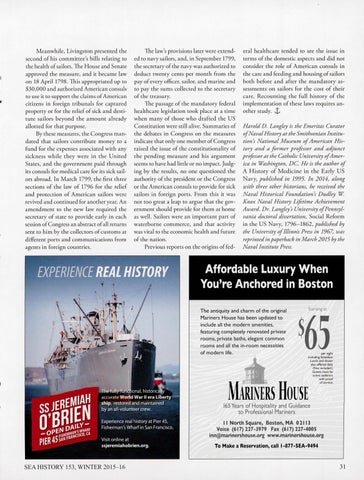Meanwhi le, Livingston presented rhe second of his commirree's bills relaring to rhe healrh of sailors. The House and Senare approved rhe measure, and ir became law on 18 April 1798. This appropriared up to $30,000 and aurhorized American consuls to use ir to supporr rhe claims of American cirizens in foreign tribunals for caprured property or for rhe relief of sick and desrirure sailors beyond rhe amount already allorred for rhar purpose. By rhese measures, rhe Congress mandared rhar sailors contribure money to a fund for rhe expenses associared wirh any sickness while rhey were in rhe Unired Stares, and the government paid through its consuls for medical care for its sick sailors abroad. In March 1799, the first three sections of rhe law of 1796 for the relief and prorecrion of American sailors were revived and continued for another yea r. An amendment to rhe new law required the secretary of state to provide early in each session of Congress an abstract of all returns sent to him by rhe collectors of customs at different ports and communications from agents in foreign countries .
,.
The law's provisions later were extended to navy sailors, and, in September 1799, rhe secretary of the navy was authorized to deduct rwenty cents per month from the pay of every officer, sailor, a nd marine and to pay the sums collecred to rhe secrerary of rhe treasury. The passage of rhe mandatory federal healthcare legislation rook place at a time when many of those who drafred the US Constitution were still alive. Summaries of rhe debares in Congress on rhe measures indicare rhar only one member of Congress raised the issue of the constirutionality of rhe pending measure and his a rgument seems to have had little or no impact. Judging by the results, no one questioned rhe aurhoriry of the president or the Congress or the American consuls to provide for sick sailors in foreign ports. From this it was not too grear a leap to argue that the government should provide for them at home as well. Sailors were an important part of waterborne commerce, and rhat activity was vital to rhe economic healrh and furure of rhe narion. Previous reports on the origins of fed-
EXRERIENCH, REA路t 路HH/SlORK路"路" ;:~.
era! healthcare tended to see the issue in terms of rhe domesric aspecrs and did not consider rhe role of American consuls in rhe care and feeding and housing of sailors borh before and afrer rhe mandarory assessments on sailors for rhe cosr of rheir care. Recounting rhe fu ll hisrory of rhe implementarion of rhese laws requires anorher srudy. j:,
Harold D . Langley is the Emeritas Curator ofNaval History at the Smithsonian Institution's National Museum ofAmerican History and a former professor and adjunct p rofessor at the Catholic University ofAmerica in Washington, D C. H e is the author of A History of Medicine in rhe Early US Navy, p ublished in 1995. In 2014, along with three other historians, he received the Naval Historical Foundation's Dudley W Knox Naval H istory Lifetime Achievement Award. D r. Langley's University ofPennsylvania doctoral dissertation, Social Reform in rhe US Navy, 1796-1862, published by the University ofILLinois Press in 1967, was reprinted in paperback in March 2015 by the Naval Institute Press.
Affordable Luxury When You're Anchored in Boston The anti qu ity and charm of t he origin al Mariners House has been updated to includ e all the mo dern amenit ies, featuring co mpl ete ly re novated private roo ms, private baths, elegant commo n rooms and all the in-roo m necess ities of mod ern life.
Starting at
~65
per night
including breakfast. Lunch and dinner also offered dai ly (Not included.)
Guests must be active seafarers with proof
of service.
165 Years of Hospitality and Guidance to Professional Mariners 11 North Square, Boston, MA 0 2113 Voice (617) 227-3979 Fax (617) 227-4005 inn@marinershouse.org www.marinershouse.org To Make a Reservation, call 1-877-SEA-9494
SEAHISTORY 153 , WINTER2015- 16
31
